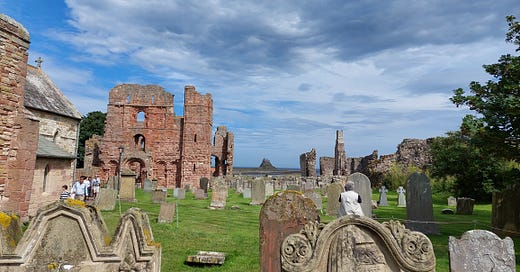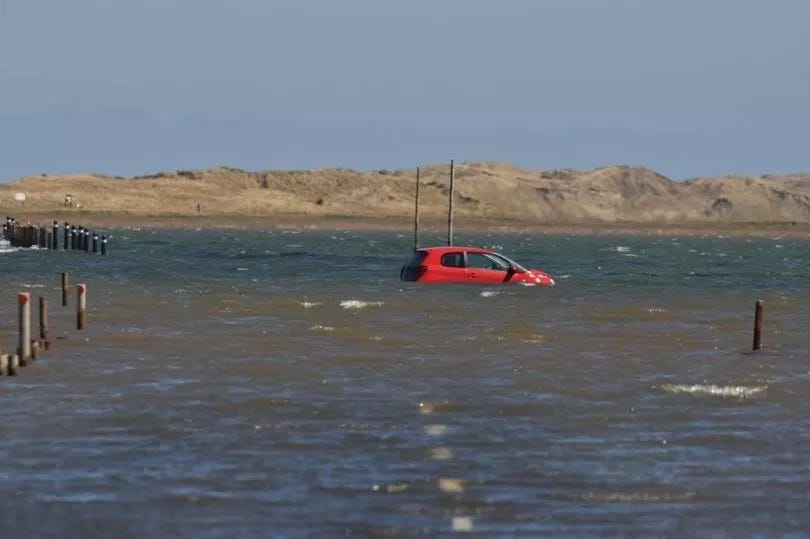In the wake of King St Oswald
Lindisfarne Priory and in the distance you can see the Castle.
The holidays have arrived and the great migration ensues with my family happily joining in; our destination being Northumbria. The ancient Kingdom looms large over Christianity in Britain, having once held lands as far north as the Lothians with Edinburgh certainly deriving its name from this Northumbrian expansion and as far south as the Humber. At the conversion of King St Edwin in 627 AD we see missionary activity begin to convert the pagan Northumbrians with the establishment of York as a Bishopric under the patronage of St Peter. King Edwin would later die in battle and after a time of uncertainty for Christianity Oswald would arrive; having previously fled to Iona for his life, he would return to take up the Crown and bring with him St Aidan. Lindisfarne would become a new centre for missionary activity and Bishopric in the north with St Aidan and his monks walking between Holy Island and the mainland (when tides allowed) to preach and baptise these earliest of Christian ancestors.
My family and I are staying about an hour south of Lindisfarne so of course like many modern pilgrims we went to visit. To visit Lindisfarne, first you must check tide times for crossing the causeway, as the local news is littered with stories of people getting caught out.
We live at a distance to nature, the supermarket being the supreme symbol of this; food just appears on our shelves and we just have to buy it - the frustration of not having enough bags is the only thing we might struggle with when we go hunting for the weeks shop. The tide born at the establishment of the moon - ‘the moon and stars you have fixed firm’1 - does not change course because we might happen to be there - through our trials and tribulations, through our achievements and gains, the tide rises, the tide falls.2
If you have ever been caught out by it you will know the oncoming fear of ‘lively waters’ as we acknowledge that this is not our domain. As Aidan, then Cuthbert and the other monks sought out space on the other Farne Islands you meet the real inhabitants; the thousands of squawking Guillemots, Kittiwakes, Puffins, Terns and Shags with the stench of their faeces in between the rough weather that batters the Northumbrian coast - you sense what it was they came here for. The confrontation of your own fragility, the grain of Sand that we are amongst the People of God but to the Face of God we might begin to see in the boundless deep.
It was from this geographic edge they made Christianity the centre of political and civic life. They remained firmly in but not of the world. Further up the coast a century or so later we meet Saint Baldred of The Bass who resided on the famous Bass Rock and yet preached and baptised on the mainland. Living on the edge did not affect their relevance, but I would chance that it powered it. The desire to separate oneself from the world drove St Anthony and St Benedict yet humanly speaking, they are the pillars in the garden of Lord that the Church was able to proliferate from.
Maybe as Catholics we should look to the edge as a place to inhabit. Not a lonely Isle, not shutting off from charity but a simplifying, getting to grips with being in but not of the world. With this, their is an apparent tension, as Jesus noted - give unto Caesar what is Caesar’s and give to God what is Gods. However Scripture shows us, a true Christian life is a blessing onto the world - the Garden of Eden, a picture of the cosmological as well as the anthropological gives us the command to Adam and Eve to ‘subdue’ the earth - what this is actually is, is bringing the Edenic bliss onto a world - though good, requiring Gods final will to be done through man. We also have the imagery of the rivers running out of Eden that formed the greatest rivers of the Middle East and Africa, including the Tigris, Euphrates, the Nile (Blue & White) and possibly even the Indus. Again, the blessing of God runs out into the world. You then have similar imagery in Ezekiel 47, in which waters flow out of the temple in progressive depth across Judah and into the Dead Sea in which it replaces the salty water with fresh water. The meaning is clear here, God’s blessing flows outward into the world from a sacred place. Then finally we have the words of Jesus in St John’s Gospel Ch 7:
If anyone is thirsty, let him come to Me and drink. 38Whoever believes in Me, as the Scripture has said: ‘Streams of living water will flow from within him.’ ” 39He was speaking about the Spirit, whom those who believed in Him were later to receive. For the Spirit had not yet been given, because Jesus had not yet been glorified.
Jesus references are not easy to find, but could include Ezekiel 36 which speaks of their hearts being sprinkled and cleansed and that the places of desolation become abundant again. It could also be a reference to Joel with the outpouring of the Holy Spirit.
All that is to say, from a sacred place - whether the Temple, or His Church - and within our hearts as believers a living water flows outward to bless. St Aidan et al imbibed daily on the edge and brought it out with them to bless the people beyond. If our Church seems to decrease, and seems to get pushed to the margins, with our beliefs and customs alien to our wider Scottish culture, why not invoke those men and women who sought the edge in our daily lives. Live in prayer, the Liturgy, the Mass. Cut off that which holds you back, for as Thomas Merton said of the Desert Fathers, they separated themselves and truly found who they were. In this finding of place we can move beyond it in service with no fear of reaching out into a hostile world. We can live powered by this eternal spring that lies within all who are baptised and given the Spirit.
Happy holidays, Eric Hanna
Psalm 8:3 from Robert Alter’s Hebrew Bible Translation.
Henry Wadsworth, The Tide Rises, the Tide Falls.




